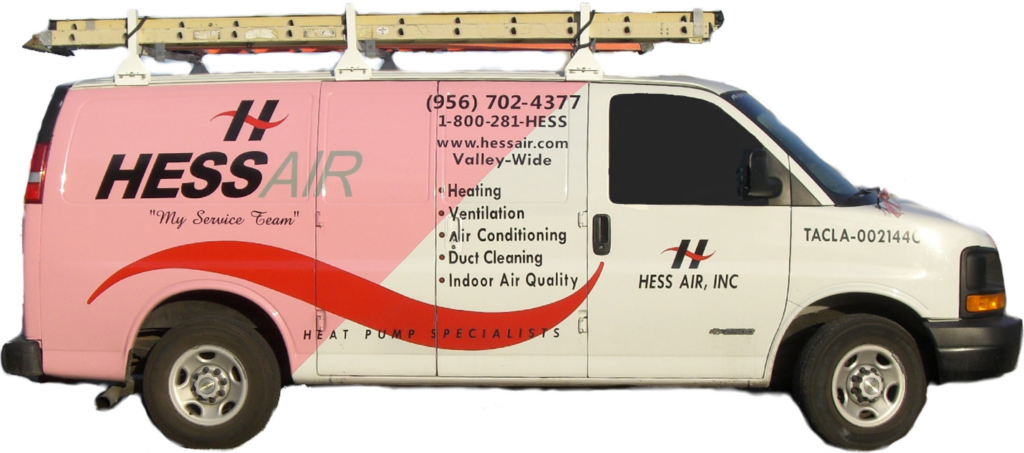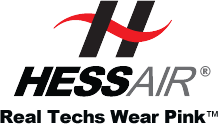Spring allergies aren’t just an outdoor problem — they find their way into your home through open windows, on your clothes, and even through your HVAC system. Pollen, dust, and mold spores can settle in vents and filters, circulating through your air and making allergy symptoms worse.
Hess Air has been helping families stay comfortable since 1976, improving their indoor air quality with simple, effective HVAC solutions. By swapping out filters, keeping ducts clean, and optimizing airflow, you can reduce allergens and breathe easier indoors.
If you’re tired of sneezing through spring, it’s time to get your HVAC system ready. Let’s go over what you can do to improve your home’s air quality.

The Role of Your HVAC System in Allergy Prevention
Your HVAC system does more than just heat and cool your home — it also controls the air you breathe. Every time it runs, it pulls in air, filters out particles, and circulates it back into your living space.
If your system isn’t properly maintained, it can do the opposite of what you want. Dust, pollen, and mold can build up in your filters and ductwork, spreading allergens instead of trapping them. This can make allergy symptoms worse, even when you’re indoors.
The good news is, a few simple upgrades and regular maintenance can keep your air cleaner. A well-maintained HVAC system helps remove allergens before they settle in your home, giving you a healthier space to breathe.

Essential Steps to Allergy-Proof Your HVAC System
Spring allergies can make it hard to find relief, even indoors. A properly maintained HVAC system reduces allergens and keeps the air inside your home cleaner.

1. Replace Your Air Filters
Air filters catch dust, pollen, and other airborne particles before they spread through your home. If they get clogged, allergens recirculate and make allergy symptoms worse.
- Replace filters every 1-3 months to ensure proper airflow and keep allergens from building up.
- Check your filter often during spring, as pollen levels can clog it faster than usual.
A clean filter helps your HVAC system run more efficiently while improving indoor air quality.
2. Clean & Maintain Your Ductwork
Ductwork collects dust, pet dander, and mold over time, especially in homes with central air. Every time your system runs, these allergens circulate through the air.
- Schedule professional duct cleaning if you notice visible dust around vents or worsening allergies.
- Inspect vents and registers for dust buildup, which can indicate dirty ducts.
- Vacuum and wipe down vents regularly to prevent allergens from re-entering your air.
Keeping ducts clean improves airflow and reduces airborne irritants. Hess Air offers duct cleaning services to help improve indoor air circulation and remove hidden allergens.
3. Install an Air Purifier
Even with high-quality filters, some allergens still make it through. Air purifiers provide an extra layer of protection by removing fine particles from the air.
- Whole-home air purifiers connect to your HVAC system to filter out allergens before they circulate.
- UV light purifiers kill mold, bacteria, and viruses that may be present in the system.
- Portable air purifiers can help improve air quality in bedrooms or other frequently used areas.
Adding an air purifier can significantly reduce allergens and improve respiratory health. If you’re considering an upgrade, Hess Air can recommend the best air purification system for your home.
4. Optimize Humidity Levels
Mold and dust mites thrive in humid environments, while dry air can cause irritation. Keeping humidity levels balanced helps minimize allergens.
- Maintain indoor humidity around 50% to create a comfortable environment.
- Use a dehumidifier in damp areas to prevent mold and dust mite growth.
- A humidifier helps if the air is too dry, which can cause throat and nasal irritation.
Balanced humidity improves air quality and keeps allergens from thriving. If your HVAC system isn’t maintaining the right humidity levels, Hess Air offers solutions to help regulate indoor moisture.
5. Clean Around Your Outdoor Unit
Your outdoor HVAC unit pulls in air, which can contain pollen, dirt, and debris. If it’s clogged, your system won’t run efficiently and may circulate allergens inside.
- Check your unit regularly and clear away leaves, grass, and dust buildup.
- Trim plants and bushes to maintain airflow and prevent debris from getting inside.
- Hose down the unit occasionally to remove pollen and dirt that could be pulled into your system.
Keeping the outdoor unit clean helps maintain good indoor air quality. Routine maintenance from professionals ensures your system stays in top shape and runs efficiently.

HVAC System Upgrades for Better Allergy Control
A well-maintained HVAC system helps reduce allergens, but upgrading certain components can make an even bigger impact. Advanced filtration, air purification, and ventilation improvements can significantly improve indoor air quality.
Upgrade Your Filtration System
Standard filters trap larger particles, but many allergens are small enough to slip through. Upgrading to MERV 13 filters helps capture fine dust, pollen, and pet dander more effectively.
- MERV 13 filters block particles as small as 0.3 microns, improving air quality.
- Needlepoint Bipolar Ionization (NPBI) technology helps remove even smaller contaminants by clumping particles together, making them easier to filter.
- Electrostatic filters can also enhance allergen removal by attracting and trapping airborne particles.
A high-efficiency filter reduces the number of allergens circulating in your home. If you’re unsure which filtration upgrade is best, HVAC professionals like Hess Air can help you choose the right option for your system.
Install Ultraviolet Air Disinfection Systems
Even with good filtration, some allergens and bacteria linger in the air. UVGI (Ultraviolet Germicidal Irradiation) systems use ultraviolet light to kill mold spores, bacteria, and viruses inside your HVAC system.
- UV light systems help prevent microbial growth in air ducts and on coils.
- Ideal for humid climates, where mold and bacteria thrive.
- Low maintenance and energy-efficient, making them a hassle-free upgrade.
Installing UV purification reduces airborne contaminants before they reach your living spaces. Many homeowners add UVGI systems to their HVAC setup to create a healthier home environment.
Improve Ventilation for Cleaner Air
Stale indoor air allows allergens to accumulate, making symptoms worse. Proper ventilation keeps fresh air flowing while maintaining energy efficiency.
- Use energy recovery ventilators (ERVs) or heat recovery ventilators (HRVs) to bring in fresh air without straining your HVAC system.
- Check ventilation settings to ensure a balance between indoor and outdoor airflow.
- Avoid over-ventilating, as it can increase humidity and energy costs.
Good ventilation prevents allergens from lingering and keeps air feeling fresh. HVAC professionals can assess your system to ensure proper airflow and air exchange.
Preventative Maintenance & Regular Inspections
Schedule Regular Tune-Ups
HVAC systems work year-round, so dirt and allergens naturally build up over time. A professional tune-up ensures that coils, filters, and airflow pathways remain clear, preventing unwanted allergens from circulating.
During an inspection, technicians clean essential components, check for airflow restrictions, and ensure filters are functioning properly.
Routine maintenance also helps prevent breakdowns, which can leave you without proper ventilation when allergy season is at its worst. For a thorough system check, Hess Air offers professional tune-ups to keep HVAC units running efficiently and allergy-friendly.

Adjust Thermostat Settings for Cleaner Air
Your thermostat plays a bigger role in air quality than you might think. Constantly turning the system on and off stirs up allergens, while the wrong humidity levels can encourage mold growth.
- Keep a steady temperature to maintain consistent airflow.
- Use a programmable or smart thermostat to optimize settings for comfort and efficiency.
- Monitor humidity levels to prevent conditions that allow dust mites and mold to thrive.
Trust Hess Air for Reliable HVAC Maintenance and Air Quality Solutions
Maintaining a clean and efficient HVAC system is essential for better indoor air quality, especially during allergy season. Hess Air provides professional HVAC maintenance, duct cleaning, and air quality solutions to help homeowners reduce allergens and keep their homes comfortable.
- Comprehensive HVAC tune-ups to ensure your system runs efficiently.
- Duct cleaning services to remove dust, pollen, and mold buildup.
- Smart thermostat installations to improve airflow and temperature control.
With decades of experience, Hess Air is committed to helping families breathe easier by optimizing HVAC systems for cleaner, healthier air. Whether you need seasonal maintenance or advanced air filtration solutions, their team is ready to assist.
Keep allergens under control with expert HVAC services from Hess Air. Schedule your service today.

Additional Ways to Minimize Indoor Allergens
Keep Your Home Clean
Allergens settle on surfaces, carpets, and fabrics, making regular cleaning essential for better indoor air quality. The right cleaning methods can help prevent dust and pollen from lingering in your home.
- Vacuum carpets and rugs with a HEPA filter to trap fine particles that traditional vacuums may recirculate.
- Dust furniture and surfaces weekly with a damp cloth to capture allergens instead of spreading them.
- Wash bedding, curtains, and pillowcases in hot water at least once a week to remove dust mites and pollen.
- Keep windows closed during high-pollen days to prevent outdoor allergens from entering your home.
- Take off shoes at the door to stop pollen and dirt from being tracked inside.
A clean home supports your HVAC system’s ability to filter air efficiently. Reducing indoor allergens helps your system work better and keeps your air fresher.
Manage Indoor Plants & Pet Dander
Houseplants can be beneficial for air quality, but they also introduce moisture and, in some cases, mold. Some plants filter airborne toxins, while others may collect dust or promote mold growth in humid conditions.
- Choose low-maintenance, air-purifying plants like snake plants, peace lilies, or spider plants to improve air quality.
- Avoid overwatering to prevent mold growth in the soil, which can release spores into the air.
Pets can also contribute to indoor allergens. Pet dander, fur, and dust can circulate through your home, making allergies worse.
- Brush and bathe pets regularly to minimize shedding and dander buildup.
- Keep pets off furniture and out of bedrooms to limit allergen exposure in sleeping areas.
- Use an air purifier to help capture pet hair and dander before they settle on surfaces.
Taking small steps to control allergens in your home complements your HVAC system’s air filtration. Cleaner air means fewer allergy triggers, making your space more comfortable year-round.
Frequently Asked Questions
How do I know if my HVAC system is making my allergies worse?
If you’re sneezing more indoors, experiencing itchy eyes, or noticing excessive dust buildup, your HVAC system may be circulating allergens. Signs like musty odors, inconsistent airflow, or clogged filters can also indicate that allergens are trapped in your system.
Can my HVAC system completely eliminate allergens from my home?
While a well-maintained HVAC system can significantly reduce allergens, it won’t remove them all. Combining high-efficiency filters, duct cleaning, air purifiers, and humidity control with regular home cleaning provides the best allergy relief.
What’s the best filter type for allergy sufferers?
For allergy relief, MERV 13 filters or HEPA filters are recommended because they trap smaller particles like pollen, dust mites, and mold spores. If your HVAC system isn’t compatible with high-MERV filters, consider an air purifier for additional filtration.
Does leaving my HVAC fan on help with allergies?
Keeping your fan set to “auto” instead of “on” prevents continuous allergen circulation. Running it constantly can stir up dust and other irritants, but using a high-quality filter and regular maintenance ensures cleaner airflow.

How can I reduce allergens in my home beyond my HVAC system?
Besides HVAC maintenance, vacuuming with a HEPA filter, washing bedding weekly, and using an air purifier can help. Keeping windows closed on high-pollen days, grooming pets regularly, and managing indoor humidity levels also minimize allergens indoors.
Conclusion
Spring allergies can be frustrating, but your HVAC system can help minimize allergens with the right maintenance and upgrades. Changing filters, cleaning ducts, improving ventilation, and optimizing humidity all work together to keep indoor air fresh and allergy-friendly.
A few small adjustments can make a big difference in how you feel at home. Regular maintenance keeps your system running efficiently, so you can breathe easier all season long.
Need a hand getting your HVAC system ready? Hess Air is here to help — schedule a tune-up today and enjoy cleaner, healthier air.













